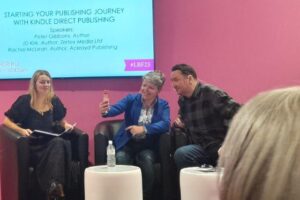Welcome back to our continuing series of articles ALLi Out and About. The Alliance of Independent Authors AskALLi team is asking members who attend book fairs, conferences or industry events (be they in-person or online) to share the lessons they've learned attending the events. This is ALLi Out and About: London Book Fair.
If you'd like to participate, and you've attended a book event, fair, conference or something else you think members would benefit from hearing about, please reach out to Sacha on sacha @ allianceindependentauthors.org.
London Book Fair: What to Expect

Image Credit: SW Millar
The London Book Fair (LBF) is one of the most prestigious and exciting events in the publishing industry.
This annual extravaganza brings together authors, publishers, literary agents, editors, and other professionals from all corners of the globe. Providing a unique platform for them to connect, collaborate, and celebrate the written word.
If you're planning to visit LBF, you're in for a treat.
It’s a bustling fair that offers an incredible array of opportunities to explore the latest trends in publishing, to attend insightful seminars and panels, and of course, to discover a vast selection of books across all genres. As you stroll through the aisles, you'll be amazed by the vibrant displays and the buzzing atmosphere as people from all walks of life come together to share their passion for literature.
In addition to the fascinating exhibitions, LBF features Author HQ—a dedicated space where indie and aspiring authors can learn from successful self-publishers, attend workshops, and gain valuable insights into the world of independent publishing. There's no better place to immerse yourself in the exciting world of books, whether you're an author, a publisher, or simply a book lover.
So, grab your visitor pass and prepare for a literary adventure like no other at LBF!
My Takeaways Around Attitudes to Indie Publishing in a (Mostly) Traditional Space

Image Credit: SW Millar
I have to say, the attitude towards self-publishing at LBF this year was a bit of a mixed bag.
On one hand, there were definitely still those who looked down their noses at indie authors. Case in point: I was sitting in on a talk in Author HQ, given by three successful indie authors, when I overheard someone behind me say, “The trouble with self-published books is, they're all rubbish.” Ouch, right? As an indie author myself and a proud member of The Alliance of Independent Authors, I couldn't disagree more.
But on the flip side, I also noticed some real positives in terms of the perception of self-publishing.
For instance, there were traditionally published authors in attendance who had made the switch to indie publishing and were more than happy to sing its praises. They spoke about how they're now earning more money and have greater control over their author businesses, which is fantastic news for those of us who have chosen the indie route.
So, while it's clear that there's still work to be done when it comes to changing the attitude towards self-publishing in the traditional space, I was heartened by the progress that's been made.
It's important for indie authors to keep pushing the envelope and demonstrating that we're just as capable of producing high-quality, engaging books as our traditionally published counterparts. After all, the more we prove the naysayers wrong, the more the conversation will shift—and that's something we can all be proud of.
My Takeaways Around AI for Authors

Image Credit: SW Millar
This year, LBF was abuzz with discussions on AI and its potential impact on the publishing industry.
AI tools like Chat GPT are rapidly gaining traction, and it's becoming clear they will significantly transform the way we approach writing and publishing. As authors, we're faced with a decision: embrace the technology and work with it, or risk being left behind as the industry evolves.
Joanna Penn, a forward-thinking author and futurist, introduced the concept of the “AI Assisted Artisan Author.” This term refers to writers who leverage AI tools to augment their creative process while preserving their distinct human touch. It acknowledges there's room for both AI-generated and human-generated content in the publishing world, and that each can coexist harmoniously to create compelling stories.
The rise of AI in the publishing sphere presents authors with an exciting opportunity to revolutionise the way we create and share stories.
By integrating AI tools into our writing process, we can streamline certain tasks, saving time and resources, while still maintaining our unique voice and perspective.
At the same time, we must also remember that our human touch is what sets us apart as authors. As we explore the possibilities of AI, let's not forget the value of our own creativity, intuition, and emotional connection with our readers.
In short, LBF demonstrated that the future of publishing will be a blend of AI-driven efficiency and human artistry. As authors, it's essential for us to embrace this change and adapt to the ever-evolving landscape of our industry.
What I'm Going to Do Differently

Image Credit: SW Millar
Reflecting on my experiences at LBF, there are a couple of key takeaways that have inspired me to make some changes in my approach to writing and publishing:
Embrace AI, while doubling down on being human
The advent of AI in the publishing world offers a wealth of opportunities to streamline our creative processes.
I'm going to explore these AI tools, incorporating them into my workflow where it makes sense. At the same time, I'll be conscious of maintaining my unique human perspective, ensuring that my writing retains its emotional resonance and authenticity.
Ignore the naysayers who shout that indie publishing is rubbish
During the fair, I encountered both skepticism and outright dismissal of self-publishing from some corners of the traditional publishing world.
However, I also met many indie authors who have successfully transitioned from traditional publishing and are now thriving. These success stories reaffirm my belief in the power and potential of indie publishing.
I'm going to continue embracing the indie publishing path, focusing on honing my craft and building my author business, regardless of the opinions of a few detractors.
By making these adjustments, I believe I can strike the right balance between leveraging cutting-edge technology and staying true to my artistic vision, all while remaining committed to the indie publishing journey.
Visiting London

Image Credit: SW Millar
Aside from the invaluable insights gained at LBF, the trip to London itself was an absolute delight.
The city has always been known for its diverse culinary scene, and I was lucky enough to savor some delicious meals during my visit. The best was a trip to Megan’s, a Mediterranean restaurant in Kensington.
I also got to see the rare books collection at The British Library, which was awesome, and sparked a new plot idea for yet another book!
One of the best highlights of the trip was reconnecting with bookish friends and meeting new ones for the first time.
It's always inspiring to be surrounded by like-minded individuals who share a passion for storytelling and the written word. These connections not only offered a sense of camaraderie but also provided the opportunity to exchange ideas, learn from each other's experiences, and discuss industry trends.
Lastly, the networking value of attending conferences like LBF can’t be overstated.

Shane Millar
Shane Millar is a Fictionary Certified Story Coach and the author of the Write Better Fiction craft guides. He is also the author of the Myth & Magic urban fantasy thriller series (writing as S. W. Millar), host of The Write Better Fiction Podcast, and a co-host on the Storytellers Faceoff Podcast.




